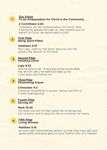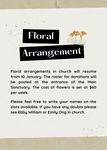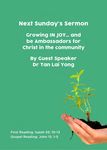ST PAUL'S CHURCH - 10 January 2021 - Webflow
←
→
Page content transcription
If your browser does not render page correctly, please read the page content below
Epiphany One
Almighty God, who anointed Jesus at his bap-
�sm with the Holy Spirit and revealed him as
your beloved Son: inspire us, your children,
who are born of water and the Spirit, to
surrender our lives to your service, that we
may rejoice to be called the sons of God;
through Jesus Christ our Lord. Amen.
Scripture Readings
First Reading: Nehemiah 2:1-8
Gospel Reading: Ma�hew 7:7-11
Today’s Sermon
Be Courageous for God
by Pastor Leon Stewart
THANK YOU
for your donations
Flowers by The Williams
Bishop Revd Canon Dr Titus Chung Vicar Rev Jeremy Ponniah
Clergy Rev Chang Lubin, Rev Ezra Sivakumar Honorary Priest Rev Peter ManimuthuExile is a strange word we don’t use much today. When my wife kicks me out of the house to take the kids to the park and give her some peace and quiet, she might jokingly say, “I’m sending you into exile.” But for the most part, it’s not common parlance anymore. Yet it’s a major theme in the Bible, one that ultimately points our hope toward coming back to God, and that alone makes it worth examining. East of Eden Eden is where we first encounter exile, at the beginning of the biblical story. When Adam and Eve rebelled and were driven from the garden (Gen. 3:24), they found themselves distant from the presence of their Creator and subject to decay, destruction, and death. As the rebellion grew, their unruly descendants “moved eastward,” carrying their insurrection “east of Eden,” until eventually they settled to build the city of Babylon with its infamous tower (Gen. 4:16; Gen. 11:2 NLT). To get a sense of the geography, it’s as if God planted a beautiful garden in Southern California for His gardeners to tend. But they began destroying the place, so they got booted and began working their way eastward through the deserts of Arizona and New Mexico, until eventually they settled in Texas to build a vast and mighty empire. The Hebrew word for exile, golah, speaks to being carried away into captivity, banished from one’s homeland. It’s related to the verb galah, which means “to uncover or remove.” Both words contain an element of being uncovered or exposed, like exiles who were often stripped bare in shame when removed from their homeland. It’s an image of disarray and distance from the life we were created for. And if exile means distance from God, the hope is in returning to Him. By the Rivers of Babylon Later in Israel’s history, this pattern is repeated. Just like Adam and Eve, the nation wrecked God’s beautiful garden, unleashing idolatry and injustice into the Promised Land. So eventually Israel was driven out into another “wilderness.” As God’s protective presence finally left the land, Babylon invaded—demolishing the temple, ravaging Jerusalem, and carrying the people back eastward into captivity (2 Kings 24:12-14). God wasn’t absent, however, but was working through this event. Calling Baby- lon’s king “My servant” (Jer. 25:9), He used that nation’s armies as a rod of correction for Jerusalem. “I am raising up the Babylonians,” God told Habakkuk, “that ruthless and impetuous people.” And the prophet responded, “You, Lord, have appointed them to execute judgment; you, my Rock, have ordained them to punish” (Hab. 1:6; Hab. 1:12 NIV). God’s purpose in the exile, however, was different from Babylon’s. The mighty empire simply wanted to tear Israel down, but God was chastising His people, shaking them to their senses and ultimately building them up by driving them
back to the life they were made for, with Him. God’s plan worked. While in exile, His people realized what a massive mistake they’d made. They began to cry out in longing for the land He had called them to, and then waited to return. The psalmist lamented, “By the rivers of Babylon, there we sat down and wept, when we remembered Zion ... If I forget you, O Jerusalem … may my tongue cling to the roof of my mouth … if I do not exalt Jerusalem above my chief joy” (Ps. 137:1; Ps. 137:5-6). It was when they were farthest from the kingdom that the people grew hungry again for their King. Land of the Living But one day the Lord would come to deliver His people. And when He did, it would be cause for hope the world over, not for Israel alone. Peoples from every nation would be invited to end their alienation from God and return to the One for whom they were made. As the prophet Jeremiah foresaw, “At that time … all the nations will be gathered to it, to Jerusalem, for the name of the Lord; nor will they walk anymore after the stubbornness of their evil heart” (Jer. 3:17). Eventually, as recorded in Ezra 1:2-4, Israel did come home, but this return was only a foreshadowing—a small picture of a much greater deliverance Jesus came to bring about. Everyone is familiar with Jesus’ parable of the prodigal son, but you might be surprised to look at it again and see these familiar themes of exile playing out (Luke 15:11-32). When the younger son asks for his inheritance—basically telling his dad to drop dead—and sets out for “a distant country” where his life unravels into destruction, Jesus’ original audience would have heard their own story echoing in His. This was Israel, running away from God and finding herself in exile in a distant land. This was Adam, rebelling against God and finding his life unraveled east of Eden. This is all of us who, under the destructive power of our sin, find ourselves far from the face of the Father. But the beauty of the gospel is that God has crossed the distance. He has come to us in Christ, invading our sin-struck, war-torn estate and bearing our decay, destruction, and death in His body on that cross. When Jesus is crucified under the pagan powers, He is bearing exile—Israel’s, Adam’s, and ours—in order to find us in the distant land and bring us back to Himself. At the cross, Jesus joins us in our ultimate exile of the grave, uniting His life with us in our death in order to raise us with Him in the resurrecting power of His kingdom. In Christ, the Father lifts us—His lost and wandering children—up onto His shoulders. Then He carries us back to the Promised Land, across the wilderness wastelands into the lavish, abundant, life-giving presence of His love.
You can also read



























































